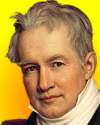 (source)
(source)
|
Baron Alexander von Humboldt
(14 Sep 1769 - 6 May 1859)
German natural scientist, archaeologist, explorer and geographer who made major expeditions to Latin America and Asia, and collected extensive geological, zoological, botanical, and ethnographic specimens.
|
The Combat With Electric Eels
From Lives of the Brothers Humboldt (1852)
[p.219] The marshes and standing waters near Calabozo [South America] are filled with electric eels. [Alexander von] Humboldt and [expedition colleague, naturalist Aimé] Bonpland wished to make experiments in their own house with these animals, but for three days they could meet with no specimen, on account of the exaggerated fears of the people for the electric effects of these animals. Tired of waiting, and as the eel which was at last brought to them offered no satisfactory results to their experiments, Humboldt determined to go himself to this dreaded and dangerous capture. The Indians thereupon took him and Bonpland to a large reservoir of slimy water, surrounded by odorous plants, near the village of Rastro de Abazo; but it was difficult to catch the electric eels with common fishing nets, as they bury themselves with great agility in the slime. They did not wish to make use of the Barbasco root, which, thrown into the water, would have stupified all the fish in it.
The Indians now declared they would fish with horses, and not until the guides had caught a quantity of wild horses and mules, and forced them to enter [p.220] the ditch, could Humboldt and his friends form any idea of this mode of fishing. The noise occasioned by the stamping of the horses, drives the eels out of the slime, and irritates them; they swim on the surface of the water, and press themselves against the belly of the mules and horses. A strange combat now begins; the Indians, provided with long thin bamboo canes, encircle the ditch: some climb the trees, whose branches extend horizontally over the water. By wild screams and threats with their long canes, they prevent the horses coming ashore and escaping. The eels, terrified by the noise, defend themselves by the repeated discharge of their electric forces. It seems, for a time, as if they would carry off the victory over the horses, for many of the latter succumb to the force of the invisible electric blows, which the eels give on the belly, the most sensitive part, and they sink below the surface, overcome by the quantity and violence of the shocks. With bristling mane, snorting, with wild terror in their sparkling eyes, some horses rise again, and endeavour to escape, but the Indians drive them back, and but few escape the eyes of the watchful guards. If such an one, escaping from the shocks of the electric eels, reaches the land, it falls at every step, and sinks down on the sand, faint and exhausted.
In the first five minutes two horses were already drowned. The eel, which is five feet long, presses against the belly of the horses, and discharges its electricity along its whole length, which stuns the abdomen, entrails, and heart of the horse. The horse sinks down exhausted, and is drowned, because the continuing struggle of the eels with the other horses prevents its rising again.
Humboldt was already anticipating that this fishing would end in the death of all the horses, when the violence of the unequal struggle gradually abated, and the exhausted electric eels dispersed; for they require long rest and abundant nourishment to regain the strength spent by the frequent discharge of their electric organs. The horses and mules recovered from their [p.221] terror, their manes no longer bristled, and their eyes no longer glared so fearfully. The Indians maintained that if the horses were driven into the water of electric eels on two consecutive days, none would die the second day. The eels now timidly approached the shore, where they were caught with little harpoons attached to long ropes. If the ropes were perfectly dry, no electricity was felt while hauling out the fish, but it was communicated through the wet ropes. In a few minutes five large eels were caught which were only slightly wounded, and others were caught in the evening in a similar manner. This was the wonderful combat of the fishes and the horses: and Humboldt adds: that power which is the invisible living defence of these water inhabitants; which is developed by the motion of moist or unequal parts; which circulates in all organs of animals and plants; which thunderingly inflames the expanse of heaven; which unites iron to iron, and guides the calm, revolving course of the needle; all this, like the colour of the prismatic ray, flows from one source—all is resolved into one eternal universal force.
- Science Quotes by Baron Alexander von Humboldt.
- 14 Sep - short biography, births, deaths and events on date of Humboldt's birth.
- Alexander von Humboldt: A Metabiography, by Nicolaas A. Rupke. - book suggestion.
- Booklist for Alexander von Humboldt.





